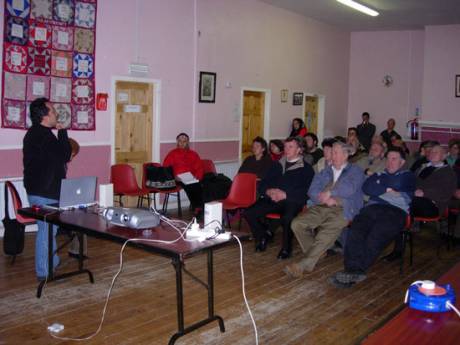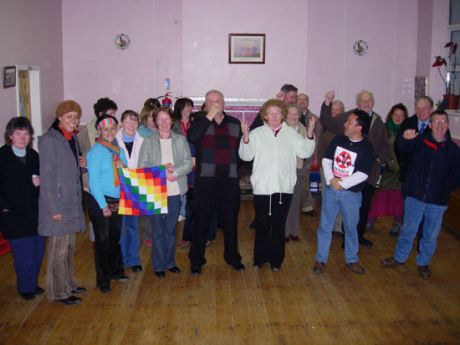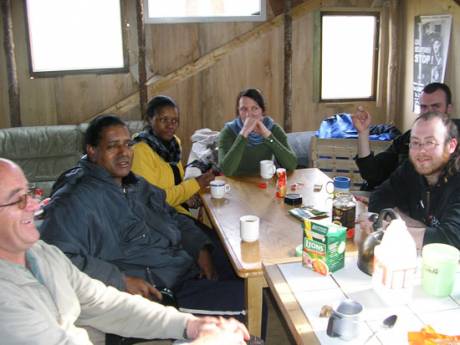|
Blog Feeds
Public InquiryInterested in maladministration. Estd. 2005
Human Rights in IrelandPromoting Human Rights in Ireland
Lockdown Skeptics
Voltaire NetworkVoltaire, international edition
|
A little corner of county Mayo that is part of an international web of resistance mayo |
anti-capitalism |
news report mayo |
anti-capitalism |
news report
 Wednesday May 17, 2006 06:23 Wednesday May 17, 2006 06:23 by Terry - Rossport Solidarity Camp by Terry - Rossport Solidarity Camp
 Reports on South African and Latin American visits to the Shell to Sea campaign in county Mayo, plus an interview with Siziwe Khanyile from Groundwork in South Africa. Of late the little corner of county Mayo which has brought Shell to a halt has been visited by people from different struggles the world over looking to learn from our experiences here and seeking to share their experiences with us. As part of the Rossport Solidarity Camp gathering on the 2nd to 5th of June we will be having speakers from the Bolivia Solidarity Campaign. Read on for reports on the Latin American and South African visits, plus an interview with Siziwe Khanyile from Groundwork in South Africa. Latin American Visit. On the 25th of April, as part of a tour organised by the Latin American Solidarity Centre in Dublin, we were visited by Ricardo from Accion Ecologica in Ecuador and Tania from Coordina de Defensa del Aqua y la Vida in Bolivia. The tour was focusing on the issue of natural resources.
The meeting opened with a film ‘Amazon Oil Pipeline – Pollution, Corruption and Poverty’. The film and Ricardo’s presentation was about the construction, beginning in February 2001, of a 500 km oil pipeline through the Amazon and the lands of indigenous peoples and in an area with 94 seismic fault lines and six active volcanoes.
Interestingly Ricardo spoke of the relationship some international conservation organisations have with corporations. The people from the Saving Iceland campaign who visited us in early March were making the same point. According to Ricardo Conservation International have a partnership with Shell and BP, and the World Wild Fund for nature have a relationship with Monsanto. Tania is from a group that has been fighting water privatisation in Bolivia. She spoke about the El Alto massacre where the army killed 60 people, residents of El Alto, a shantytown city on the outskirts of La Paz, Bolivia’s capital. This was during the so-called gas war. In the question and answer session afterward, when asked about the new government of Evo Morales she said the social movements had supported Morales but are maintaining their independence so as to challenge the new government should it not fulfil its promises. South African Visit.
On the 12th of May we were visited by Des D’Sa from the South Durban Community Environmental Alliance and Siziwe Khanyile from Groundwork.
The meeting started with a moments silence for the hundreds of people killed the day before in a pipeline explosion in Nigeria.
|


























 printable version
printable version

 Digg this
Digg this del.icio.us
del.icio.us Furl
Furl Reddit
Reddit Technorati
Technorati Facebook
Facebook Gab
Gab Twitter
Twitter
View Comments Titles Only
save preference
Comments (2 of 2)
Jump To Comment: 1 2The first thing I wanted to ask you, is a pretty basic question, what is the environmental justice movement in South Africa, what does that term mean?
I think traditionally what we have seen in South Africa is that there has been a very strong environmental movement where you had your conservation types, you know, and they were seen in a particular way as, you know, very distant and doing their own thing caring about the environment and animals and not about people but the environmental justice movement links the struggles of people because it relates not only to pollution and the environment but it relates to peoples’ everyday lives, the poverty that people face, the injustices that they face in their lives, and it makes those linkages so it is not too far removed from peoples’ everyday struggles.
So Groundwork would have a particular focus on supporting communities that are located near hazardous developments?
That’s right yeah.
So what would your relationship be like with shall we say “mainstream” environmentalism in South Africa?
I think on campaigns and on our own struggles and their struggles and for example with the national environmental management legislation we would support them in pushing for certain legislation and likewise they would support us but I would find that they are very far removed from the community and what is happening on the ground they are more I dunno if it is left or right I’m not sure where they are situated but they are environmentalists so there isn’t too much linkage although our concerns are for farmers and people who go fishing and so if the sea is affected by an oil spillage or whatever we will support those people because it is affecting their welfare it is not just an environmental issue so there are those linkages depending on what is the struggle at any particular time.
Can you tell us a bit about the kinda day-to-day activity of Groundwork?
Well Groundwork is obviously an environmental justice non-governmental non-political organisation, we work within communities focusing on equality, air pollution, waste management, we also focus on corporate accountability and basically we try and build the capacity of communities to be able to resist, to be able to engage at various levels, be it with government, industry, local or national government, and just to spread the message with their communities that communities can stand up and bring about awareness and education within communities. So really it is to empower people to engage in their own governance, particularly on these issues of waste and pollution and corporate accountability.
I notice you use the term environmental justice movement; the same term is used in the United States, would there be an influence there from the United States?
I don’t know. Well I think we have our own context as Americans would have their own context and certainly environmental justice applies in our context.
In terms of the community struggles around environmental issues in South Africa like in South Durban that we were hearing about yesterday how much of an influence does the heritage of the anti-apartheid struggle have?
In terms of environmental justice the influences of the anti-apartheid? Let me think about that one. I think that what has happened is over the years is that people who have been involved in the struggle against apartheid have sort of moved away from environmental justice and other issues that relate to civil society and impact on society, they have gone into government and we find them on the other side of the fence basically. And people who could have really been supporting y’know the struggle of people, of people on the ground, are now on the other side of the fence whereas they struggled before and attained whatever has been attained for the country they are now longer part of this struggle we are going through now they are on the other side of the fence.
I think it was Des who was saying last night that “all political parties including our comrades have gone the neo-liberal route of economic development at all costs” but now you have a “movement of people” that is separate from political parties, so could you maybe elaborate on that?
Well I think that what has happened is that y’know when we gained independence or we gained freedom in 1994 we had our own government or a black government in place, people had hopes that people, ordinary citizens, would suddenly have all these rights and have y’know what comes with rights, housing and electricity and free education, which were things which the Freedom Charter in the A.N.C. aspired to pre-1994 and they came into power promising people that this is what we are going to deliver and people were really y’know looking forward to that. I think what happened was y’know after a couple of years y’know privatisation came about and there was retrenchment in companies as a result and people started becoming very disillusioned with the existing government which they had voted into place but I think what happened was the first five years in power people were still like no it’s coming y’know our government is still going to deliver give them time they have never sort of ruled before they have never been in government before give them a bit of time and voted them in again for another five year term. People started getting agitated and started thinking no, y’know first five years and nothing has happened give them an opportunity, another five years, ten years in power people really started getting upset and y’know past year or two you have seen a rise in y’know social movements, people who are anti-privatisation, landless peoples movement, people who are just saying we want free housing, people who are just standing up and saying we are not getting the things we want because of government policy we are not getting the things that we should be getting and there is a few elite, or black elite, that is rising up as a result of black economic empowerment, affirmative action policies are benefiting a few and the majority are left in the cold as the majority are poor people and there isn’t a lot to raise those people to a particular standard. So there is that disillusionment, so the social movement is once again rising whereas before it was focused on apartheid and the racial problem now it is focused on social economic issues.
I heard it said last night at the meeting that you have an “integrated struggle” so is it very much the case that the environmental justice movement is kinda one facet of a struggle that also involves housing and also involves privatisation and so on
We try to integrate it, I mean we support them, what I have found myself going into communities, and we did that just in the past month, going into the communities and just trying to understand what are your priorities, what are your real issues on the ground that you are facing, because very often people will come from the top and say these are your problems but we went and said what is it that you are really struggling with and people obviously said the usual the poverty, the AIDS, the access to health, and pollution y’know. And we have always made it a point that where people are campaigning on housing or whatever we are there with them because it is all linked, it is all justice, it is all human rights basically. If you live next to a polluting refinery you cannot work because your health is affected if you cannot work you cannot have a house so a whole lot of y’know it is all interlinked that is how we view it.
When I was asking about the anti-apartheid struggle I mean I know what you say about the leadership of the A.N.C. but what I mean is there a reservoir of skills and experience and methods that is now being applied to other issues?
People who had for years been engaged in that struggle got to a point where ‘we have attained our freedom now’, even people who were in the Church, who over a period of many years were with the A.N.C., were supporting the A.N.C., who should have stayed neutral and stayed with the people with the struggles of the people joined with the government I mean they justify it their own way but at the end of the day the ruling party is a political party and at some point you tow the party line. If there is a policy which is not favouring the people there is a lack of delivery of basic services to the people y’know you become part of what you have joined and it is difficult to be in two places at once, so to speak.
I mean more at the grassroots level are you drawing on the experience and tactics and so forth that you would have used in South Africa in 1988 against apartheid at the grassroots level like or is it the case that in the context of the democratic government there is a whole different range of tactics that the grassroots would use?
Yeah our president was once saying that we shouldn’t be going in the streets that was what was done during apartheid, there is no need to be doing that now and there has been an attempt to suppress people who wanted to go out in the streets and march and so you would find that the local government wont allow them, they will not give them permission to do it, whereas it is their democratic right to go and march. I think the tactics have remained pretty much the same as they have worked, because they have been seen to work in the past and yah people go out in the streets and they do their thing.
I wanted to ask you about building international links which I guess seems to be important to youse, like here you are in Mayo, can you tell me a bit about the international links you have built and also a bit about why you came to Mayo?
There have been many international links that have been formed relating to waste management, relating to incineration, relating to medical waste management and things like that and y’know with Friends of the Earth International, of which we are a chapter, and you know it is important to forge those links, what we do as Groundwork is we forge those links taking communities from the fenceline of a polluting industry and we take them to other fenceline communities to learn and to share experiences that they can take back home and apply. We have done that over the years between different communities, both locally within South Africa and also in Africa and also with America for instance we have taken people across from there we have taken Americans to South Africa to draw those links to learn those lessons.
And the reason we came to county Mayo was number one to show the solidarity with the people here and number two just to y’know share our lessons that we have learnt over the many years the SDCEA (South Durban Community Environmental Alliance) and Groundwork have been challenging the industry and have been at loggerheads with Shell in particular and to learn what you guys are doing here as well and definatly take it back home and internationalise the struggle that is happening here because yah it can be won on a local level but if there is international pressure on the Shell government …I mean on the Irish government and on Shell international it is that much more powerful if Shell can be embarrassed world over. Yah the likelihood of success for the campaign is certainly increased.
I wanted to ask you what do you think the most important lesson is that you can bring from South Africa?
I think that if there is one thing they can learn is that looking at what people in South Durban have gone through I mean you don’t want that to happen in this place I mean not just people in Durban but people anywhere Shell operates or most places where Shell operates just knowing and seeing that I think that is a lesson enough. You don’t want the health implications, you don’t want the pollution, you don’t want their pipelines, it is a total injustice and I think that the people here can definatly learn from the experiences of Durban and learn that Shell will say lets talk and you don’t want to get into those discussion because it is a stalling mechanism y’know it has never worked before it is all about talk talk and no action. So I think people here definatly they know that but I think that the evidence that it is happening and seeing the pictures and hearing the people talk about it is invaluable.
What has been your impression of the campaign here, what things have struck you?
O my God just the area itself is so incredibly beautiful, I think in county Mayo people are incredibly fortunate, it is a wonderful place, I could live here myself I wouldn’t mind. And the people, the spirit, the fighting spirit, against all odds, just people going and manning a caravan taking turns I find that amazing, people coming and sitting in a camp yah the spirit is just incredible and the determination and people being aware that whatever it takes or being determined that whatever it takes y’know this cannot happen in our community. God I wish I could take it home. That is one lesson I have learnt.
So if we were victorious here what international impact do you think that would have?
Huge. It is like if these guys can do it then it is possible. I think we would say how did you do it and invite you over and say tell us what did you do, how did you win that battle, help us, Shell is doing this or this industry is saying that how did you guys succeed in that, and I think it would be such a wonderful lesson for the rest of us, as much as now we are coming and saying y’know we have won the battles, a few battles, but we havn’t won the war, so if you guys can win the war it would be incredible.
.